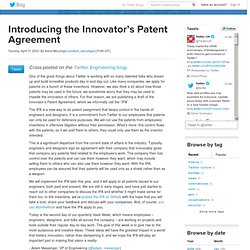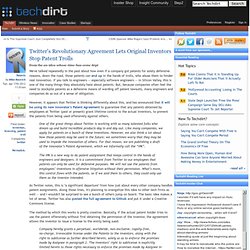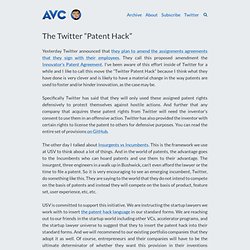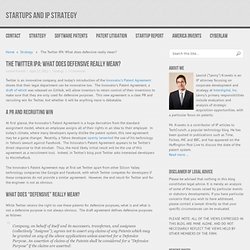

Introducing the Innovator's Patent Agreement. Cross-posted on the Twitter Engineering blog.

One of the great things about Twitter is working with so many talented folks who dream up and build incredible products day in and day out. Like many companies, we apply for patents on a bunch of these inventions. However, we also think a lot about how those patents may be used in the future; we sometimes worry that they may be used to impede the innovation of others. For that reason, we are publishing a draft of the Innovator’s Patent Agreement, which we informally call the “IPA”. The IPA is a new way to do patent assignment that keeps control in the hands of engineers and designers. This is a significant departure from the current state of affairs in the industry. We will implement the IPA later this year, and it will apply to all patents issued to our engineers, both past and present.
. - Adam Messinger, VP of Engineering (@adam_messinger) Twitter's Revolutionary Agreement Lets Original Inventors Stop Patent Trolls. We've talked repeatedly in the past about how even if a company got patents for solely defensive reasons, down the road, those patents can end up in the hands of trolls, who abuse them to hinder real innovation.

If you talk to engineers -- especially software engineers -- in Silicon Valley, this is one of the many things they absolutely hate about patents. But, because companies often feel the need to stockpile patents as a defensive means of warding off patent lawsuits, many engineers and companies do so out of a sense of obligation. However, it appears that Twitter is thinking differently about this, and has announced that it will be using its new Innovator's Patent Agreement to guarantee that any patents obtained by employees at Twitter (past or present) grant lifetime control to the actual inventors, to prevent the patents from being used offensively against others.
The method by which this works is pretty creative. The Twitter "Patent Hack" Yesterday Twitter announced that they plan to amend the assignments agreements that they sign with their employees.

They call this proposed amendment the Innovator's Patent Agreement. I've been aware of this effort inside of Twitter for a while and I like to call this move the "Twitter Patent Hack" because I think what they have done is very clever and is likely to have a material change in the way patents are used to foster and/or hinder innovation, as the case may be. Specifically Twitter has said that they will only used these assigned patent rights defensively to protect themselves against hostile actions.
And further that any company that acquires these patent rights from Twitter will need the inventor's consent to use them in an offensive action. Twitter has also provided the inventor with certain rights to license the patent to others for defensive purposes. The other day I talked about Insurgents vs Incumbents. USV is committed to support this initiative. The Twitter IPA: What does defensive really mean? « Startups and IP Strategy. Twitter is an innovative company, and today’s introduction of the Innovator’s Patent Agreement shows that their legal department can be innovative too.

The Innovator’s Patent Agreement, a draft of which was released on GitHub, will allow inventors to retain control of their inventions to make sure that they are only used for defensive purposes. This new agreement is a clear PR and recruiting win for Twitter, but whether it will be anything more is debatable. A PR and Recruiting Win At first glance, the Innovator’s Patent Agreement is a huge derivation from the standard assignment model, where an employee assigns all of their rights in an idea to their employer.
In today’s climate, where many developers openly dislike the patent system, this new agreement may be a game changer. What does “Defensive” Really Mean? While Twitter retains the right to use these patents for defensive purposes, what is and what is not a defensive purpose is not always obvious. Management vs.